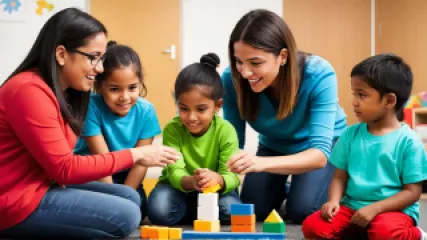Expert Insights on Helping Kids Build Resilience
Welcome to our interview feature on the topic of childhood resilience building. In this article, we have gathered expert insights from professionals in the field who will provide valuable advice and strategies for helping kids build resilience. Resilience is a crucial skill that enables children to navigate challenges, bounce back from setbacks, and develop a strong sense of self. Our experts will share their knowledge and expertise to guide parents, caregivers, and educators on fostering resilience in children.
Interviewer: Wilford Watkins
Expert: Dr. Angel Lambert - Child Psychologist
Wilford Watkins: Thank you, Dr. Lambert, for joining us today. Could you please start by explaining what resilience means in the context of childhood?
Dr. Angel Lambert: Absolutely, Wilford. Resilience refers to the ability to adapt and cope with adversity, stress, and challenging life situations. It involves bouncing back from setbacks, developing problem-solving skills, and maintaining a positive outlook. Resilient children can effectively navigate through difficult emotions and experiences, ultimately leading to their personal growth and success.
Wilford Watkins: That's fascinating, Dr. Lambert. How can parents and caregivers help children develop resilience skills?
Dr. Angel Lambert: There are several strategies that parents and caregivers can implement to strengthen resilience in children:
- Nurture a supportive and loving environment: Building a strong foundation of love, trust, and support is essential for children to develop resilience. By providing a safe space for them to express themselves and offering emotional support, parents can foster their child's ability to cope with challenges.
- Encourage problem-solving: Resilient children are resourceful and capable problem solvers. Parents can help develop these skills by encouraging their child to find solutions to everyday problems. This allows them to build confidence in their abilities and develop essential problem-solving skills.
- Promote a growth mindset: Teaching children that failure is a part of the learning process and that they have the ability to improve and grow can significantly impact their resilience. Encouraging a growth mindset helps children view challenges as opportunities for growth rather than insurmountable obstacles.
- Teach emotional regulation: Resilience involves managing and understanding emotions effectively. Parents can support their child's emotional development by teaching them strategies for regulating their emotions, such as deep breathing exercises or journaling.
- Celebrate successes: Recognizing and celebrating a child's achievements, no matter how small, can boost their self-esteem and foster resilience. This instills in them the belief that they have the ability to overcome challenges and achieve their goals.
Interviewer: Emerson Hawkins
Expert: Vivian Dunn - School Counselor
Emerson Hawkins: Welcome, Ms. Dunn. It's a pleasure to have you here. How can educators contribute to building resilience in students?
Vivian Dunn: Thank you, Emerson. Educators play a vital role in fostering resilience in students. Here are some practices that can be implemented in the educational setting:
- Create a safe and inclusive classroom environment: Establishing a positive and welcoming classroom environment where students feel safe to express themselves and take risks is crucial for developing resilience. This can be achieved through respectful communication and promoting inclusivity.
- Teach problem-solving and decision-making skills: Providing opportunities for students to engage in problem-solving activities and make decisions empowers them to take ownership of their learning. This helps develop resilience by encouraging them to find solutions to challenges independently.
- Encourage collaboration and teamwork: Collaborative projects and group activities teach students how to work together, compromise, and support one another. This cultivates resilience by fostering teamwork and teaching students the value of collective problem-solving.
- Provide opportunities for reflection: Allowing students to reflect on their experiences and learn from their mistakes is a powerful way to enhance resilience. Educators can facilitate this process through journaling, group discussions, or individual reflections.
- Set realistic expectations: Setting achievable goals and providing students with clear expectations helps prevent feelings of overwhelm or failure. By breaking tasks into manageable steps, educators can support students in developing resilience and maintaining motivation.
Interviewer: Angel Lambert
Expert: Dr. Emerson Hawkins - Child Psychiatrist
Angel Lambert: Dr. Hawkins, thank you for being part of our interview. How can parents and educators address setbacks and failures to promote resilience in children?
Dr. Emerson Hawkins: Thank you for having me, Angel. Addressing setbacks and failures is crucial for building resilience in children. Here are some strategies:
- Normalize setbacks: It's important to help children understand that setbacks and failures are a natural part of life. By normalizing these experiences, parents and educators can teach children that it's okay to make mistakes and that they can learn from them.
- Encourage a growth mindset: Emphasizing the importance of effort and perseverance rather than focusing solely on outcomes helps children develop a growth mindset. This mindset enables children to view setbacks as opportunities for learning and personal growth.
- Provide support and validation: When children face setbacks, it's essential to provide emotional support and validate their feelings. This creates a safe space for them to express their emotions and helps them feel understood and supported.
- Teach problem-solving skills: Actively involving children in finding solutions to overcome setbacks empowers them to take control of their circumstances. By teaching problem-solving skills, parents and educators equip children with the tools they need to navigate challenges.
- Model resilience: Children learn by observing the behavior of adults around them. Parents and educators can model resilience by demonstrating positive coping strategies, perseverance, and adaptability in the face of challenges.
Building resilience in children is an ongoing process that requires patience, consistency, and a supportive environment. By implementing the strategies shared by our experts, parents, caregivers, and educators can empower children to develop the resilience skills necessary for navigating life's ups and downs. Remember, resilience is a valuable gift that will benefit children throughout their lives.
Note: The views and opinions expressed in this article are those of the experts and do not necessarily reflect the official policy or position of our organization.






